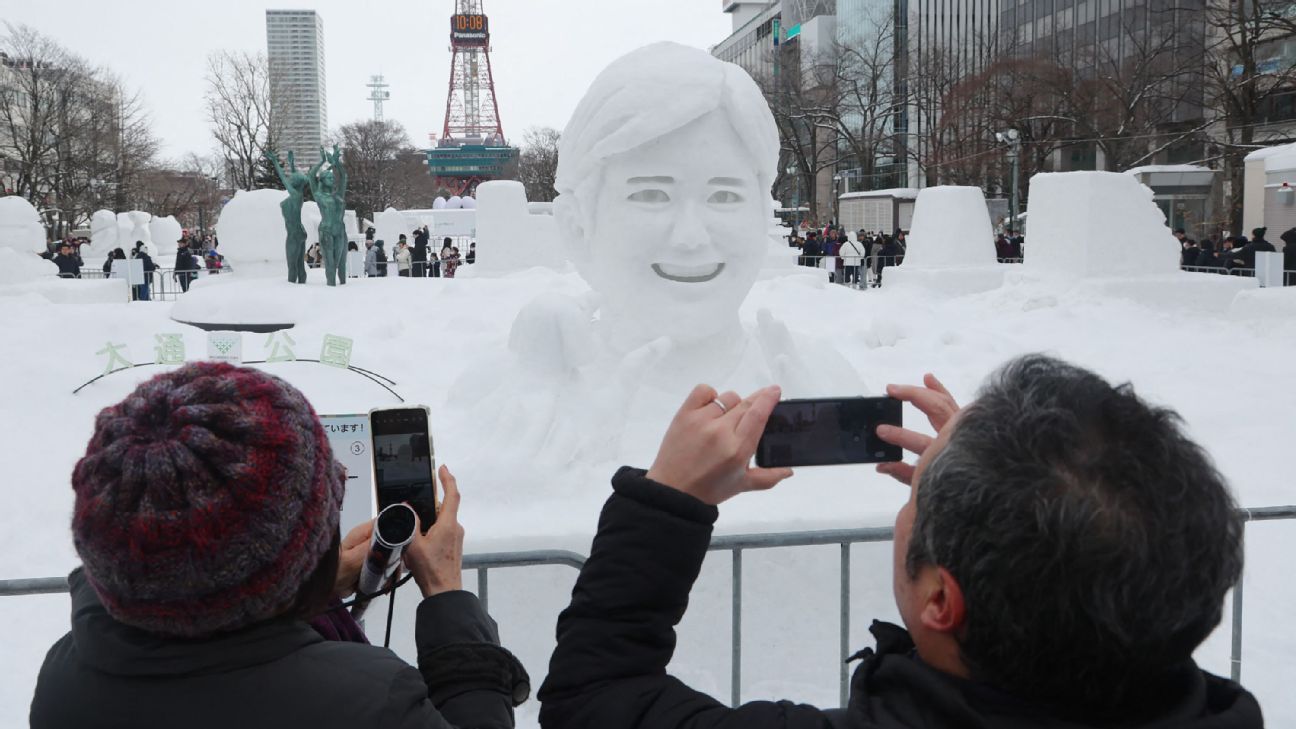GLENDALE, Ariz. — Seiko Watanabe stood beside the pathway to the baseball fields at the Los Angeles Dodgers‘ spring training facility on a recent weekday morning, wearing a white Shohei Ohtani jersey purchased from the team’s store a day earlier. She kept one eye on her 6-year-old son — outfitted with a Dodgers cap, a Dodgers glove and a blue Dodgers shirsey with Ohtani’s No. 17 on the back — and the other on a nearby door from where players typically emerge.
Two days earlier, Watanabe had flown close to 6,000 miles from her Japanese hometown of Yokohama in hopes of merely catching a glimpse of Ohtani, with no guarantee of an autograph or even an interaction.
“I just want to see him,” she said. “That’s my dream.”
Twelve months ago, Dodgers president of baseball operations Andrew Friedman sat on the bleachers in Miyazaki, Japan, to watch the Japanese national team practice for the World Baseball Classic and thought about people like Watanabe. He was struck by the thousands of fans who showed up, but also by how their loyalties were splintered across a half-dozen Major League Baseball teams. He imagined them all wearing Dodgers gear instead. That image stayed with Friedman and his front-office lieutenants throughout 2023 — and helped push them to allocate more than $1 billion for Ohtani and Yoshinobu Yamamoto.
“I think the passion for the game of baseball there is as strong or stronger than any other country in the world,” Friedman said. “And so in an ideal world, in the next five to 10 years, we’re going to have kids growing up as Dodger fans.”
The Dodgers have yet to play their first game of 2024 — that will happen Thursday, in an exhibition contest against the division-rival San Diego Padres, at 3:10 p.m. ET on ESPN — but their standing as the predominant MLB team of Japan is already becoming clear.
Dodgers-branded wine has been sold at liquor stores in Japan; Japanese publications have previewed the Dodgers’ upcoming season as closely as they would any local team; and the iconic No. 16 jersey of former Dodgers pitcher Hideo Nomo has been popping up all over Camelback Ranch, the Dodgers’ spring training home. In the two-month stretch that encompassed Ohtani’s free-agent decision and Super Bowl Sunday, the Dodgers were searched on Google twice as often in Japan as they were in the United States.
“Every single day, you see the news about Dodgers, Shohei Ohtani and Yoshinobu Yamamoto,” Watanabe said. “Every channel. Every evening news, you see it.”
About a dozen Japanese photographers and videographers have stationed themselves on the outskirts of the Dodgers’ facility every morning shortly after sunrise, waiting to capture Ohtani and Yamamoto as they drive into the players’ parking lot. Ohtani’s first interview session, on Feb. 9, was attended by about 70 credentialed media members. Later that afternoon, at least that many stood along a rope to watch Yamamoto, Nippon Professional Baseball’s MVP three years running, warm up with fellow Dodgers starter Walker Buehler.
“Obviously baseball is kind of covered differently than other sports, and when you get the personalities and the following that those two guys get, it kind of becomes a little bit more like a football Sunday every day,” Buehler said. “I think it’s great for us as a team, great for a lot of the guys on our team that are going to get more attention for what they do and for our team as well. You can kind of go back to the World Baseball Classic and the coverage and the energy and the vibe that that gets. I think it’s good for the game to be covered in this way.”
The Dodgers had a foothold on Japan in the mid-1990s, when Nomo-mania swept Los Angeles. Nomo won the National League Rookie of the Year Award in 1995 and finished within the top five in Cy Young voting for a second straight time the following year. He faded shortly thereafter, but his presence and prowess spawned a generation of people in Japan who would grow up to be Dodgers fans.
Since then, Japan’s biggest stars — Ichiro Suzuki, Hideki Matsui, Yu Darvish and Daisuke Matsuzaka, not to mention Ohtani when he first came to the big leagues in 2017 — have signed elsewhere. But with this winter’s moves, the Dodgers re-claimed their title as Japan’s team, at least in the mind of Scott Okamoto, a lifelong Angelino who has followed the Dodgers since the 1970s.
A little less than two years ago, Okamoto started a podcast, “Asians in Baseball,” about Asian representation in the major leagues, alongside Kim Cooper and Naomi Ko, two women in their early 30s who discovered the sport through the hoopla over the Chicago Cubs‘ World Series title in 2016 and fell in love with it while watching Ohtani establish himself as a two-way star in 2021. Ohtani’s influence in Japan in the 2020s evokes Michael Jordan’s imprint on American culture in the 1990s.
“Everyone from your 90-year-old grandmother to your toddler has heard Ohtani’s name in Japan,” Okamoto said. “It’s that pervasive.”
Ohtani’s introductory news conference on Dec. 14 was carried by five different networks in Japan and drew a worldwide audience of 70 million people. His Dodgers jersey set a Fanatics record for sales within the first 48 hours of release, breaking a mark previously held by soccer star Lionel Messi, when he joined Inter Miami.
The Dodgers, who don’t release specifics on ticket sales, are all but certain to reach the 4-million mark in attendance for the first time this season. The Angels, sources said, made around $20 million annually in additional sponsorship and marketing revenue while they employed Ohtani over these last six years, and league sources expect the Dodgers — a far more global brand to begin with — to do significantly better. The immediate tangible gains are obvious. What’s harder to grasp is what this will mean in the long term.
“I don’t think we understand the magnitude of it all,” Dodgers general manager Brandon Gomes said.
Perhaps Rōki Sasaki, the 22-year-old Japanese pitching sensation the Dodgers and 29 other teams are salivating over, will prioritize L.A. when he gets posted in the near future. Perhaps the generation that follows him will do the same, having grown up at a time when their idols wore Dodger Blue.
“I certainly think that that had to be part of the calculus,” said Dodgers manager Dave Roberts, who was born in Okinawa, Japan.
“We’ve talked a lot over the years of doing everything that we can to be a destination spot, where our own players don’t want to leave, where players from other teams are longingly looking at the Dodgers and wanting to play there,” Friedman said. “And to the extent that that can extend to the elite players that are going to play in the NPB over the next 15, 20 years, that’s even better.”
The post ‘We’re going to have kids growing up as Dodger fans’: How L.A.’s plan to win over Japan has begun appeared first on Patabook Sports.

